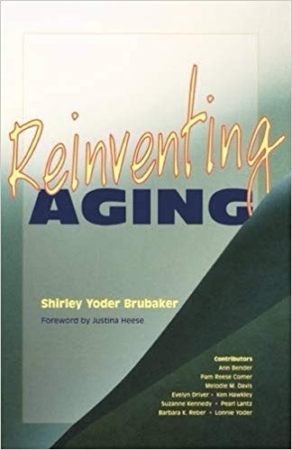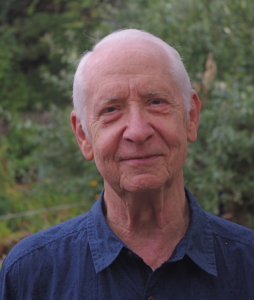Reinventing Aging – Shirley Yoder Brubaker
Book Review by Barrie McMaster
 These days, aging is changing! And so is how we look at it. No longer do we speak of “golden age”, a no-change, one-size-fits-all platitude. Instead, aging is recognized as the third third of one’s life, a period of immense variety and – even better – immense potential.
These days, aging is changing! And so is how we look at it. No longer do we speak of “golden age”, a no-change, one-size-fits-all platitude. Instead, aging is recognized as the third third of one’s life, a period of immense variety and – even better – immense potential.
Although the lifestyle varieties in old age seem endless, people still try to fit life into categories, of course. One researcher says waggishly that there are five stages: “go-go, go-slow, slow-go, slow-slow, and no-go”. What a contrast to a couple of generations ago, when old age was defined, perhaps best, by the title of the BBC retirement-home comedy, “Waiting for God”. As the tide of boomers becomes a swell, it raises the attention we pay to aging. Look at the title of this research project compilation, Reinventing Aging. This book itself, published in 2003 by Herald Press, is a good 21st century compendium on a topic that was relatively new then.
This “reader” is formatted for adult study groups aged forty and up. It is oriented to churches, but not at the expense of useful advice to individuals of any stripe. By now, it breaks no new ground, but it still offers a good sampling of the new insights on aging, along with lots of “stuff you should know.” Today, some chapters hint of a patronizing writing tone, the book still has value. Because it can also serve for group discussions, the book contains a study guide along with four other appendices.
This collection of essays opens with a discussion of stereotypes and issues that an aging person must deal with, like loss of identity (“Who did you used to be?”). It warns, aging can spark a faith struggle for some. It brings clarity to chestnut sayings like “aging is not fun”. (It adds that “illness” is not fun, regardless of age, and we all age differently, so beware of stereotyping.) For all of that, the aging process can be a time to integrate the threads and memories of one’s life to this point. It can be a time of great community – or of loneliness, depending upon outlook and circumstances. And one author proclaims, “Aging is a normal process. It is not a disease….”
That observation does bring up some realities of physical aging. For instance, be aware that a medical problem in one system may trigger a problem in a related function within the body. The same is true in understanding the impact of medications for specific maladies. The book urges readers to seek out the books and the wealth of information on the internet, to remain well. The tone of the paper on physical aging is practical and the author reminds us that health conditions do not appear only at age 65. Another chapter sums up a good discussion of physical, spiritual and intellectual wellness with the adage, “use it or lose it”.
There is a chapter on considerations for a time when a couple or even an individual does “lose it” and must seek help. What is the role of family members and how does one think of the options? It’s worth knowing about, or thinking about, even though looking only at the positives and enjoying the ride is much more fun. I liked a citation in this discussion, Psalm 92 (vv. 12-14): “The righteous flourish like the palm tree, and grow like a cedar in Lebanon. … In old age, they still produce fruit; they are always green and full of sap.” (emphasis mine). So here’s to sap!
A comment on the jacket of Reinventing Aging says the book’s “lofty goal is nothing less than to revolutionize the way we see and respond to aging in our families and churches.” So let’s talk about the chapter on “redirection”.
It picks up on the theme that the last third of your life can be the best third: “Aging is truly an opportunity to either do what you never had the chance to do before, or capitalize on the skills and interests acquired over a lifetime and use them in new ways.” Well, amen! It speaks of opportunities for service, for adventure (or a combination of the two), for travel, for local volunteer involvement and social enjoyment, hobbies, and spirituality. “This time of your life,” says the author, “like all times, is a very good one if we know what to do with it.”
There is a practical chapter on financial affairs, based on notions of responsible financial stewardship and on making good choices. Those foundations apply generally, of course, but they become more crucial as one ages. In the context of faith communities, the author notes that talking about finances in a church context is often stifled because of a desire for privacy, but she notes that the principles have changed little since Jesus’ time. Think of counting the cost, so you don’t undertake what you can’t finish; acknowledge a shared responsibility for your own family; seek advice and counsel from those who share your values (“and beware of those who don’t”). There are more nuggets of wisdom in this work.
The financial affairs chapter also covers estate planning, highlighting five key areas where decisions must be made: money, legal affairs, emergency medical decisions, guardianship of minor children (if it applies), and giving your heirs the information they need to carry out your wishes. The estate needs documents like your will and a couple of other letters that give power to someone to act on your behalf when you can’t. The author counsels, don’t overlook government programs to help. But do take on the task!
One of the themes that repeats through the book is the need to plan ahead to avoid grief. The authors say well-considered, desirable outcomes always beat forced choices made in a crisis.
Make plans and have time to consider your options on where you will live, how and whether to downsize, whether to live next to adult children or even whether to just buy an RV and take off! “Enter this stage just as you would the college age,” the author suggests, “with curiosity, with anticipation, by doing a self-inventory and researching the options.” But do plan. This is a strong chapter, setting out a surprising number of options if you start early.
How does one adapt to change? For some people, it’s difficult, but others will adapt with ease. Regardless whether it seems hard or easy, remember the adage that you can’t teach an old dog new tricks, and remember it’s a lie!. A 2002 research project cited in this chapter tells us the older brain learns well and has the capacity to do so, unless there is some complication like degenerative disease. A researcher, Richard Restak, is quoted saying, “Our brains have the capacity to change no matter what our age.” There’s more. The book says, “Older people hold a clear advantage over younger minds because they have the ability to put things in context (emphasis mine) and reach a good decision with less information – otherwise known as wisdom.” You can learn and adapt even better by making new friends, especially younger friends with younger ideas, the author suggests.
Oh – and do think about your own death because that will make things easier on everyone, including you! When that stage comes and the you have already dealt with issues of dying well and on funeral planning, you’ll be more at ease, and feel the time was worthwhile. As you plan ahead, the author says, think about the good things, too. The main thing is to plan. Remember the five “stages” of aging at the start of this review? Do spend time on planning and communicating your ideas, and avoid the need to add a sixth phrase to “go-go, go-slow, slow-go, slow-slow, and no-go“. Don’t add, “uh-oh!”

Barrie McMaster
Barrie McMaster is an award-winning news reporter and radio broadcast executive best known for his work in the B.C. Lower Mainland. He reported on many major events in and around Greater Vancouver and was a familiar voice on CKNW newscasts. He helped to put a new Fraser Valley radio station, STAR-FM on-air as its program director. He holds an M.A. in Political Science, and shaped and taught the first two-year broadcast journalism program at the B.C. Institute of Technology.
He is active in volunteer work in the Valley, having served as president of Chilliwack’s Rotary club, a director on the Ann Davis Transition Society board, Chilliwack Social Planning Council, Chilliwack Symphony Society and many political campaign committees. He served as B.C. Correspondent for the Mennonite Brethren Herald magazine and continues as a freelance writer.
His passions include his local church, where he has served as an elder for many years. He and wife Jan have travelled frequently to West Africa as members of instructional teams. At home, they often serve together on community projects and passionately love and enjoy family and grandchildren. Barrie plays the cello, loves travelling, and enjoys time with friends.
He likes to share the fact that aging is far better than it’s cracked up to be. “It can be a wonderful time of life.”






